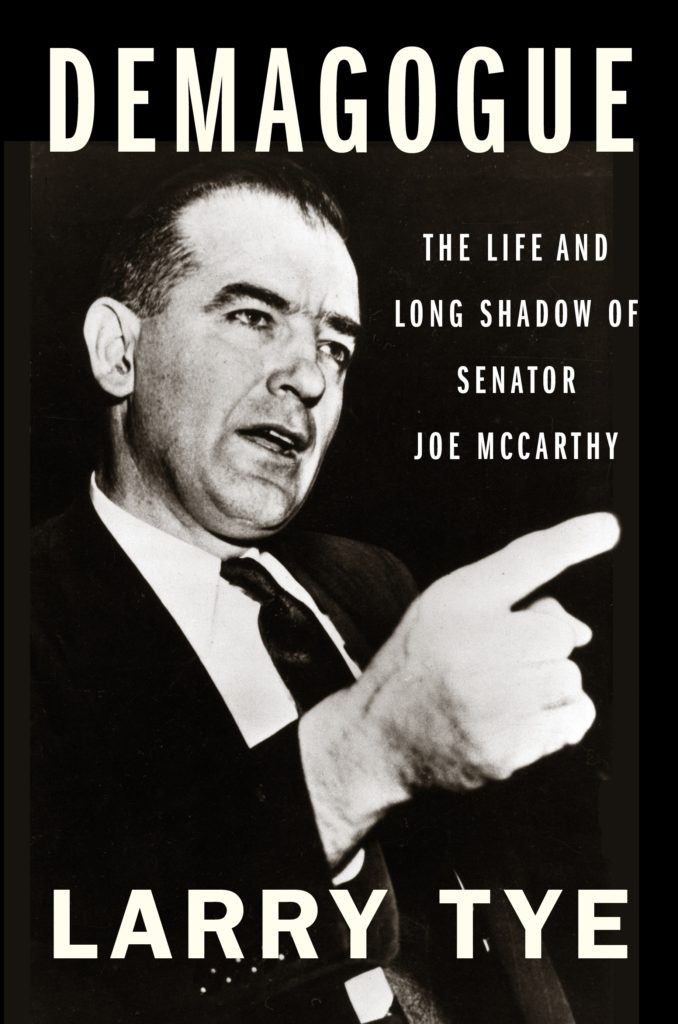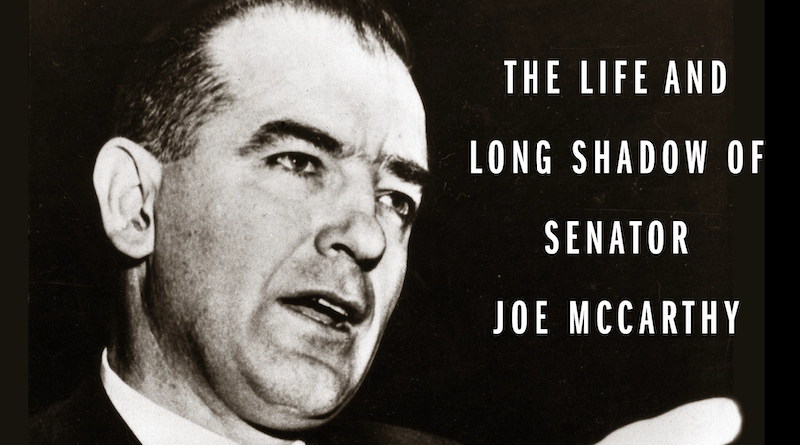INTERVIEW: Learning the lessons of McCarthyism in new book ‘Demagogue’
Image courtesy of Houghton Mifflin Harcourt / Provided with permission.
Senator Joe McCarthy, a Republican from Wisconsin, instilled terror in the American psyche during his congressional hearings in the 1950s when he was hunting for supposed communists in the State Department, military and general public. Although his track record of finding actual Soviet spies was largely a failure, his demagoguery and condemnation had a far reach, shaping the early parts of the Cold War and testing the patience of President Dwight D. Eisenhower.
McCarthy’s legacy and his continued influence on politicians in 2020 is the subject of the new biography, Demagogue: The Life and Long Shadow of Senator Joe McCarthy, by Larry Tye, who has written books on everyone from Bobby Kennedy to Satchel Paige.
Tye has been on a journey to understand the impact of McCarthy’s so-called witch trials, and his journey actually began with President Barack Obama.
“Not long before the 2016 election I had signed up to write a biography of Barack Obama, and not long after the election I realized that we won’t know Obama’s legacy until the end of the era of Trump,” Tye said in a recent phone interview. “But I had had a friend who was the official historian of the U.S. Senate whispering in my ear for years, saying there’s some new material out there about Joe McCarthy. And his story really is resonant for today rather than just a matter of history, and I didn’t believe that so much until after the 2016 election when it became clear it was a story of today and was a story that I should be writing.”
Tye’s book doesn’t make too many references to the current occupier of the White House, but the parallels are obvious throughout the 500 pages of this biography. As McCarthy’s personal and professional lives are laid bare there are more than a few subtle hints that the making of a demagogue was not unique to this Wisconsin senator. Sadly it’s a political phenomenon that seems to repeat itself time and time again.

When Tye’s friend turned him on to the story of McCarthy, he was referencing 9,000 pages of transcripts of the senator during closed-door hearings. These was largely an un-mined treasure trove.
“And that was material that had been out there but that nobody had really looked at,” the author said. “Reporters had written their next-day stories, but no biographer had looked at and nobody had gone deep into it. So he knew about that, but what we both knew was that there was other material out there that nobody had ever seen, which were all of McCarthy’s personal and professional papers that his widow had donated to Marquette University, his alma mater, 60 years ago. And after 60 years, biographers had written only that they tried to get it but couldn’t, and that was controlled by the McCarthy family.”
For Tye, it appeared that those papers would remain off-limits, but he gave it the old college try to see if the McCarthy family would bend a bit and let him peruse the senator’s files. The writer informed his publisher he was going to make the attempt to access the Marquette archives, but, a year later, he was ready to give up the quest. He was spent, and his told his publisher and wife it was a no go.
“A week after I said that, I get an email from Marquette saying that the family would let me look at them in a strange and exclusive way, where [on] the day that I stopped looking they go under lock and key again, and so I had access to a whole second trove of materials,” Tye said. “And the last thing that was out there were the full military records from the Marines, some of which had been released, but many of which hadn’t, and all of his medical records from Bethesda Naval Hospital, which nobody other than his doctors had ever seen. And in the end, for reasons that I’m not sure, I got access to those as well, and I’d like to tell you it was because I was so charming that nobody could say no to me. But if you knew me, you would know that wasn’t true. I think it was more likely that I was just more of a pain in the neck and wouldn’t go away, and finally they realized the way to get rid of me was to say yes.”
Throughout Demagogue Tye makes it a point to talk about the embellishments that McCarthy spun to the press and the public, but he also points out that there were sometimes grains of truth behind the exaggerations.
“I was fascinated that there were chapters in his life that the press and critics had convinced themselves that he was not just embellishing but outright lying, like his military records, that I find that he was telling the truth,” the author said. “There were other things, other chapters where he came out looking even more dastardly and dissembling than historians had said. It comes out, I hope, as a more nuanced portrait, and I hope as a more complete portrait because we now have access to the complete records. And for better or worse, my take will have to stand as a defining one because it will be a long time, I suspect, before anybody else will get to see this stuff. I hope I got it right, and if I couldn’t write a good book based on all the new access I had, shame on me.”
The issue of how a demagogue rises to political power is a common theme throughout the book, and Tye has a few theories. For the McCarthy example, he points to the decade before the congressional hearings that made the senator an infamous historical example. In the 1930s and 1940s, the issue of communism and anti-communism was even more pointed in the United States
“There were a lot more real communist spies,” Tye said. “Harry Truman went after communists with a loyalty program unlike any scrubbing of government employees that we had ever seen, and had Harry Truman really believed in it more than he did, we’d be calling it Trumanism. McCarthy came along late to the game, to the hunt, and it was more because he was such an extraordinarily effective self-promoter that we call it McCarthyism even though the scare that it was symbolizing was around for a decade before, and even though he was the least likely of any of them to catch a 24-karat spy.”
Tye goes one step further, adding that there was a legitimate public purpose to catch Soviet spies. There was a genuine threat to American security, the author argues, but he likes to point out that there was a difference between “spies” and “communists.” This conceit also has connections to the 21st century.
“There were a lot of people then and fewer but still legitimate today who espouse socialism, leftist politics, and that ought to be OK to be out there among the many ideas that we put forward that the public can decide whether to buy into,” Tye said. “And just the fact of it being communism shouldn’t be enough to repudiate it, although in the wake of McCarthyism, somebody being a socialist or a communist 70 years later still remains as a disqualifying factor to much of America. And the president and others can today still brand people.”
The author recently heard on talk radio a public official start to throw around the term Marxism, and Tye sees this strong language as an “automatic disqualifier” for many people in the United States.
“I think there were spies for the Soviets,” he said. “The Soviets were a real threat, and going after that was one thing. But making it a matter of somebody’s political ideology … a lot of people who were communist back then they just saw that as a more egalitarian system, and I wish that that was legitimate to discuss.”
Tye’s book is broken down into a variety of chapters, one that looks at the victims of McCarthyism and another that investigates the enablers of this anti-communism tirade. Those who supported the senator’s efforts included wealthy benefactors in Texas and many of his constituents in Wisconsin. Plus, there was a political vacuum because the Democrats said it was the Republicans’ problem to stop McCarthy, while the Republicans were more interested in their narrow Senate majority. Few people, at least in the senator’s early years, vowed to stop the demagoguery.
“Dwight Eisenhower waited two years, and he said I know McCarthy will do himself in,” Tye said. “And he did, but in those two years lots of lives were ruined. So there’s an extraordinary parallel to today. I hope it’s a parallel that inspires people like Mitt Romney and maybe Susan Collins to show their independence and stand up when they see what they think is bullying. More importantly or more relevantly there’s a parallel with people like Mitch McConnell [and] the person of Robert Taft, the Republican leader 70 years ago. Taft knew what McCarthy was doing was wrong. He told his friends it was wrong, and he told the public full steam ahead.”
By John Soltes / Publisher / John@HollywoodSoapbox.com
Demagogue: The Life and Long Shadow of Senator Joe McCarthy by Larry Tye is now available from Houghton Mifflin Harcourt. Click here for more information.


